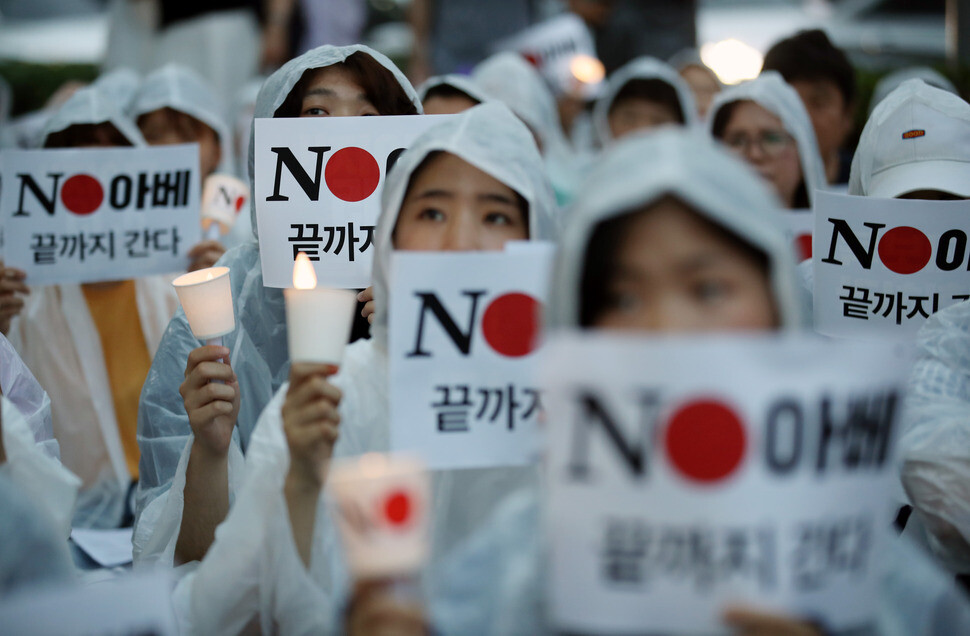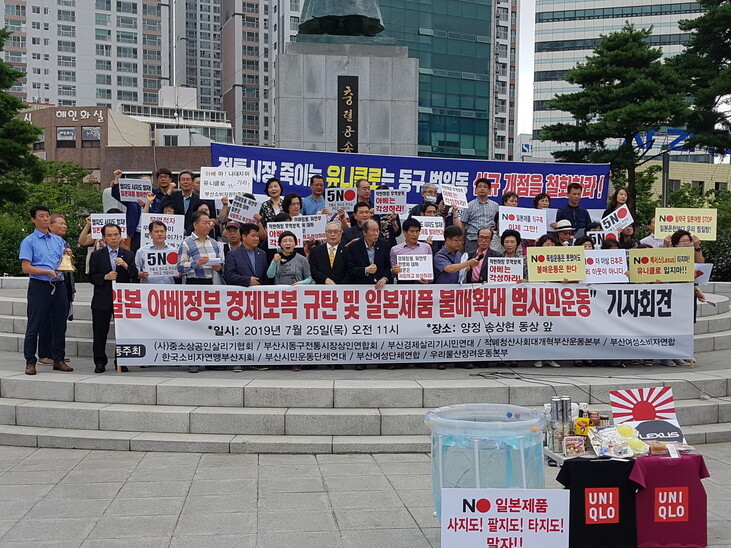hankyoreh
Links to other country sites 다른 나라 사이트 링크
S. Korea’s boycott against Japan magnifies in intensity and breadth

A campaign to boycott Japanese products has been spreading among both progressive and conservative South Koreans in response to Japan’s recent economic retaliation measures.
In addition to efforts to amend ordinances and restrict private contracts with Japanese companies implicated in war crimes, local governments have been declaring halts to exchange with Japan and canceling field trips.
During a press conference in front of a statue of General Song Sang-hyeon in the Jeonpo neighborhood of Busan’s Busanjin district on July 25, around a dozen local civic groups representing a diverse spectrum of philosophies and political affiliations announced they were launching a “five ‘no’ campaign: no buying or selling Japanese products, no traveling, no riding, and no wearing.”
Participants called on others of all philosophies and political affiliations to join the boycott of Japanese products.
“It stands to reason that the whole country should unite and fight when it is under attack by a foreign power,” they said. “Japan has launched an economic invasion, and now it’s time for us to do what we can as citizens of the Republic of Korea.”

A push by local governments to suspend exchanges with Japan has also been gathering speed. After the city of Busan’s announcement that it would begin a full-scale re-examination of its exchange efforts with Japan, seven local governments in Gyeonggi Province – the cities of Suwon, Uijeongbu, Paju, Gwangmyeong, Yangju, Goyang, and Dongducheon – moved to either cancel or postpone their exchange schedules with sister cities in Japan.
Additionally, efforts are under way to amend ordinances to restrict local governments from signing private contracts with Japanese companies implicated in war crimes. Hong Myeong-hwan, a member of the Jeju Provincial Council, announced on July 25 that he planned to sponsor an ordinance bill restricting the signing of private contracts with war crime-implicated Japanese companies by the Jeju Province (Office of Education).
Cultural exchange between South Korea and Japan has taken a direct hit as well. The National Research Institute of Maritime Cultural Heritage cancelled plans to hold an embarkation event at a festival at Izuhara Part in Tsushima on Aug. 3–4 involving a boat restored last October, which was used to carry Joseon Tongsinsa (goodwill mission) emissaries during the 17th to 19th centuries.
Plans for student learning activities and field trips to Japan are also being canceled. On July 25, the Gwangju Metropolitan Office of Education announced that it had canceled a Japan visit by the South Korea-Japan youth peace exchange group. The South Jeolla Office of Education previous sent notices to affiliated organizations and schools recommending that they refrain from official business trips and learning activities in Japan.
By Kim Kwang-soo, Busan correspondent, Ahn Kwan-ok, Gwangju correspondent, Hong Yong-duk, South Gyeonggi correspondent, Park Im-keun, North Jeolla correspondent, Huh Ho-joon, Jeju correspondent, and Lee Ju-hyeon, staff reporter
Please direct comments or questions to [english@hani.co.kr]

Editorial・opinion
![[Column] Park Geun-hye déjà vu in Yoon Suk-yeol [Column] Park Geun-hye déjà vu in Yoon Suk-yeol](https://flexible.img.hani.co.kr/flexible/normal/500/300/imgdb/original/2024/0424/651713945113788.jpg) [Column] Park Geun-hye déjà vu in Yoon Suk-yeol
[Column] Park Geun-hye déjà vu in Yoon Suk-yeol![[Editorial] New weight of N. Korea’s nuclear threats makes dialogue all the more urgent [Editorial] New weight of N. Korea’s nuclear threats makes dialogue all the more urgent](https://flexible.img.hani.co.kr/flexible/normal/500/300/imgdb/original/2024/0424/7317139454662664.jpg) [Editorial] New weight of N. Korea’s nuclear threats makes dialogue all the more urgent
[Editorial] New weight of N. Korea’s nuclear threats makes dialogue all the more urgent- [Guest essay] The real reason Korea’s new right wants to dub Rhee a founding father
- [Column] ‘Choson’: Is it time we start referring to N. Korea in its own terms?
- [Editorial] Japan’s rewriting of history with Korea has gone too far
- [Column] The president’s questionable capacity for dialogue
- [Column] Are chaebol firms just pizza pies for families to divvy up as they please?
- [Column] Has Korea, too, crossed the Rubicon on China?
- [Correspondent’s column] In Japan’s alliance with US, echoes of its past alliances with UK
- [Editorial] Does Yoon think the Korean public is wrong?
Most viewed articles
- 1[Column] Park Geun-hye déjà vu in Yoon Suk-yeol
- 2Thursday to mark start of resignations by senior doctors amid standoff with government
- 3[Editorial] New weight of N. Korea’s nuclear threats makes dialogue all the more urgent
- 4Will NewJeans end up collateral damage in internal feud at K-pop juggernaut Hybe?
- 5Why Korea shouldn’t welcome Japan’s newly beefed up defense cooperation with US
- 6[Guest essay] The real reason Korea’s new right wants to dub Rhee a founding father
- 7Kim Jong-un expressed ‘satisfaction’ with nuclear counterstrike drill directed at South
- 8[Column] ‘Choson’: Is it time we start referring to N. Korea in its own terms?
- 9N. Korean hackers breached 10 defense contractors in South for months, police say
- 10[Column] Yoon’s first 100 days should open our eyes to pitfalls of presidential system